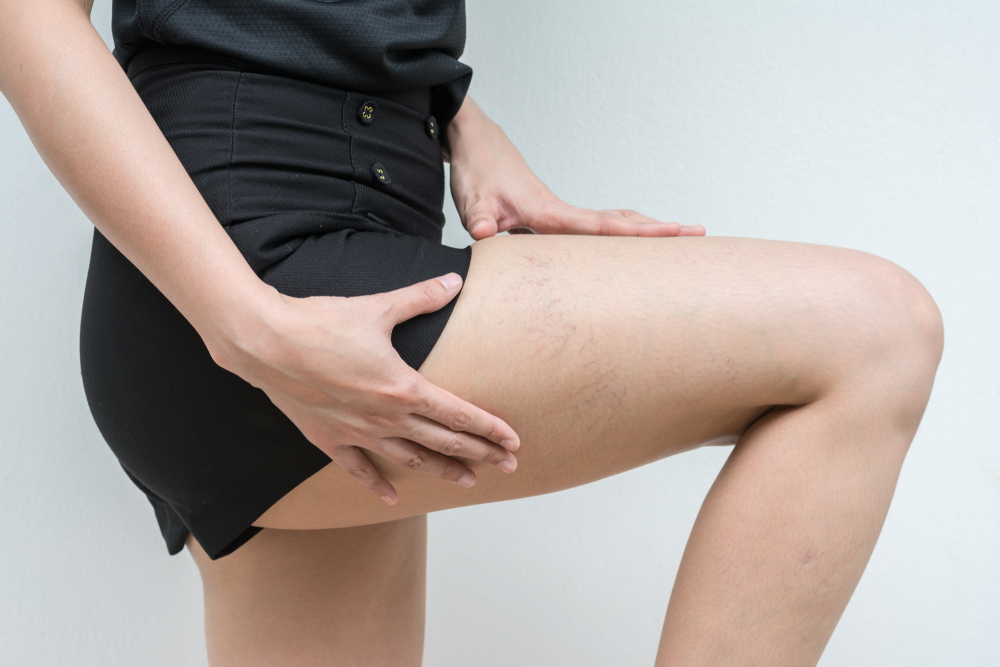Varicose veins can be uncomfortable, unsightly, and even painful. They can make it harder to sit or stand for prolonged periods, travel, or engage in certain activities that exacerbate them. But what is the cause of varicose veins?
Many factors are involved, and if you’re struggling with them, you’re not alone. Understanding what causes varicose veins is the first step in effective management and treatment.
Varicose Veins: A Quick Overview
Varicose veins are twisted, swollen veins that often appear blue or dark purple and usually occur in the legs. They develop when the valves in the veins don’t work correctly, causing blood to pool and the veins to enlarge.
This condition is common and typically not serious, but discomfort, pain, and cosmetic concerns are frequent varicose vein symptoms. Treatment ranges from lifestyle changes and compression stockings to minimally invasive procedures or surgery in severe cases.
Primary Causes of Varicose Veins
Varicose veins are formed when the valves in the veins malfunction, causing blood to leak in the wrong direction and pool, resulting in the veins becoming enlarged and twisted.
Some of the main causes of varicose veins include:
- Genetics: Family history increases the likelihood of developing them.
- Age: Risk increases as vein walls weaken and valves become less efficient with age.
- Gender: Women are prone to varicose veins, possibly due to hormonal influences.
- Hormonal Changes: Puberty, pregnancy, and menopause can lead to hormonal fluctuations that affect vein health.
- Occupation: Jobs involving prolonged standing or sitting can impair blood flow.
- Obesity: Excess weight puts added pressure on veins, leading to valve damage and vein enlargement.
- Pregnancy: Increased blood volume and pressure on the veins during pregnancy often lead to varicose veins.
- Previous Blood Clots: A history of blood clots can damage veins, increasing the risk of varicose veins.
Lifestyle and Environmental Contributors
In addition to the primary causes above, varicose veins can be worsened by lifestyle and environmental factors.
If you’re concerned about varicose veins you already have or wondering what may exacerbate their discomfort, here are some potential contributors:
- Prolonged Sitting or Standing: Sedentary lifestyles or occupations can exacerbate varicose veins.
- Lack of Exercise: Physical inactivity weakens vein walls and impairs circulation.
- High Heels: Wearing high-heeled shoes can impede blood flow in the legs and worsen discomfort.
- Tight Clothing: Restrictive clothing, particularly around the waist and legs, can hinder blood circulation.
- Sun Exposure: Too much exposure to sun can damage the skin and veins, which may worsen varicose vein symptoms for some people.
- Smoking: Smoking can weaken blood vessels and impair circulation.
- Diet: Eating ultra-processed foods that are high in saturated fat, added sugar, and sodium while being low in fiber and nutrients (e.g., soda, pastries, sugary snacks) can contribute to unintentional weight gain that exacerbates varicose veins.
- Hormonal Birth Control: There are some forms of hormonal birth control that may increase the risk of varicose veins.
Varicose Veins Causes: Myths vs. Facts
Varicose veins are a common condition, but there is plenty of misinformation about what causes them. We’ve listed some of the most common myths about what causes varicose veins — and set the facts straight.
Myth: Only elderly individuals get them.
Fact: While age is a risk factor, varicose veins can form at any age due to factors like genetics, hormonal changes, and lifestyle.
Myth: Only women get varicose veins.
Fact: Men can also get them, especially with factors like obesity, genetics, and occupations.
Myth: Crossing your legs causes varicose veins.
Fact: While crossing legs for extended periods may exacerbate existing varicose veins, it doesn’t directly cause them.
Myth: Varicose veins are purely cosmetic.
Fact: While varicose veins can be unsightly, they can also cause symptoms like swelling, pain, and discomfort. In more severe cases, they can potentially lead to skin ulcers or blood clots.
Myth: Varicose veins are always hereditary.
Fact: Genetics plays a significant role, as do weight, hormones, and lifestyle choices.
Myth: Varicose veins will go away on their own.
Fact: Varicose veins are unlikely to disappear without medical intervention, but lifestyle changes can help manage symptoms.
Navigating Through Varicose Vein Causes
You don’t have to navigate the causes and plan of action for your varicose veins alone. We’re here to help.
Should you pursue medical guidance, among the first things our vein specialists will do is conduct a varicose veins diagnosis and work to understand unique risk factors and underlying causes. Based on the evaluation, a customized treatment plan will be created.
Our team at Empire Vein Specialists provides varicose vein services to patients in Inland Empire, Riverside, San Bernardino, Moreno Valley, and surrounding areas of California.
For questions about varicose veins or to set up a consultation, please call 1.800.VARICOSE.
